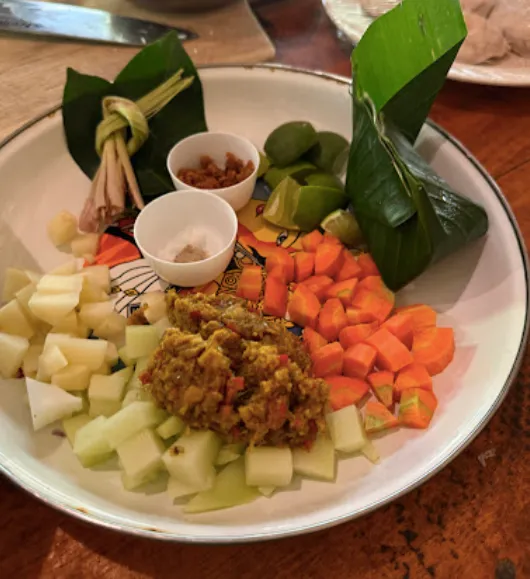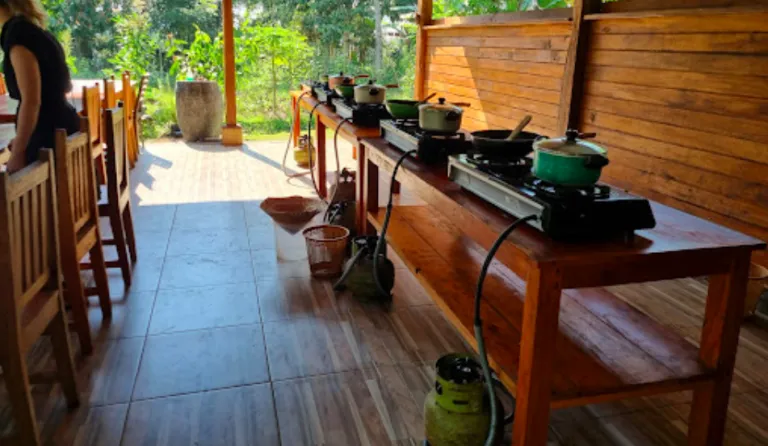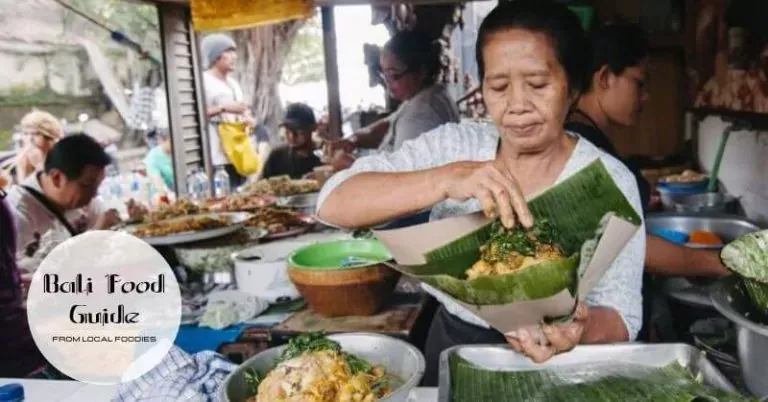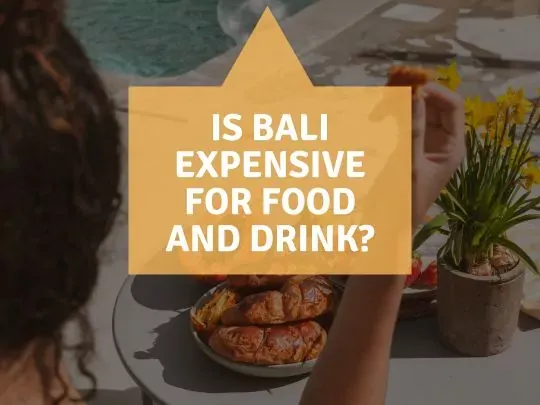Have you ever wondered what lies beneath the surface of Bali’s vibrant culture? Well, look no further than the captivating world of Balinese words and meanings. From everyday conversations to ancient rituals, these words hold profound significance in Balinese society.
Balinese words are not just a means of communication; they encapsulate centuries-old traditions, beliefs, and values. Let’s learn Balinese words and meanings so you can understand Balinese life better.
Quick Tip: The single most useful word you can learn is “Suksma” (Thank You). It will open doors and bring smiles wherever you go in Bali!
The Language Landscape of Bali
Bali is a captivating island famous for its stunning nature and lively culture, and it has a lot of dialects. This linguistic tapestry adds to the allure of this Indonesian paradise, making it a fascinating destination for language enthusiasts. The three main languages you will encounter are Balinese (Basa Bali), Indonesian (Bahasa Indonesia), and English.
While Balinese is the local mother tongue, Bahasa Indonesia is the official language of the country and is widely understood. Due to tourism, English has become increasingly prevalent, bridging communication gaps between locals and visitors from around the world.
Beyond these, several distinct dialects can be heard across different regions of Bali, adding further depth to the linguistic landscape of the island.
The Importance of Greetings & Basic Phrases
Knowing how to greet people politely is the fastest way to show respect and connect with local culture.
The Most Polite & Respectful Hello
When you go to Bali, the most respectful way to say hello is “Om Suwastiastu.” This phrase is more than just a hello. “Om” is a sacred sound representing the universe. “Suwastiastu” means well-being or good fortune. So when you say “Om Suwastiastu,” you are wishing someone happiness and prosperity.
How do you reply? You can say the same thing, “Om Suwastiastu,” or just “Suwastiastu.”
10 Key Phrases for a First Conversation
| English Phrase | Balinese Phrase |
| I | Tiyang (polite) or Cang (less polite) |
| You | Ragane (polite) or Ci (less polite) |
| What’s your name? | Nyen Adan Ragane/Ci? |
| My name is… | Adan Tiyang/Cang… |
| How are you? | Ken-ken kabare? |
| I am fine | Tiyang/Cang becik-becik |
| Where are you from? | Uling dija ragane/ci? |
| I am from… | Tiyang/Cang uling… |
| Thanks | Suksma |
| You’re welcome | Suksma Mewali |
How to pronounce those words and phrases?
15 Other Daily Basic Greetings
| English Phrase | Balinese Phrase |
| Hi / Hello | Hai / Halo |
| Long time no see | Mekelo sing metepuk |
| Are you okay? | Ragane becik-becik? |
| Good morning | Rahajeng semeng |
| Good afternoon | Rahajeng tengai |
| Good evening | Rahajeng peteng |
| Sleep tight | Rahajeng mesare |
| Congratulations | Selamat |
| Have fun | Selamat meliang-liang |
| Happy holiday | Selamat liburan |
| Good luck | Dumogi berhasil / Dumogi sukses |
| Get well soon | Dumogi gelis kenal / Dumogi engal seger |
| Yes | Nggih or Inggih |
| No | Ten or Nenten |
| See you | Sampai jumpa |
How to pronounce those words and phrases?
Practical Balinese for Everyday Situations
Here are some essential words and phrases to help you navigate your Bali adventure with confidence.
How to Politely Address Locals
If you don’t know someone’s name, you can use these respectful terms to get their attention:
| Balinese Word | Meaning | Example |
| Bli | Brother (for a man) | Bli, ngidang nulungin tiyang? / Brother, can you help me? |
| Gek | Sister (for a woman) | Gek, dija toko paling paek? / Sister, where is the nearest shop? |
| Ibu / Bu | Mother (for an older woman) | Ibu, Dija dadi meli yeh? / Mam, where can I buy some water? |
| Bapak / Pak | Father (for an older man) | Pak, Tulungin arah jalan ke pura? / Sir, could you please direct me to the temple? |
How to pronounce those words and phrases?
Asking Questions Like a Pro
These question words are essential for any conversation:
| English | Balinese | Example |
| What? | Ape? | Ape tulungin tiyang? (What can I help?) |
| When? | Pidan? | Pidan teka? (When did you arrive?) |
| Why? | Kenape? | Kenape sing bareng? (Why didn’t you come along?) |
| Who? | Nyen? | Nyen ngemaang ne? (Who gives this?) |
| Where? | Dija? / Kija? | Dija ngoyong? (Where do you stay?) |
| How? | Kenken? | Kenken kabare? (How are you?) |
15 Useful Phrases When You Go Around
10 Useful Phrases When You Go Shopping
Want to try your hand at bargaining in a traditional market? These phrases will help!
| English Phrase | Balinese Translation |
| Cheap | Mudah |
| Expensive | Mahal |
| Excuse me | Permisi |
| I want to buy this one | Tiyang lakar meli ne |
| How much is it? | Aji kuda harga ne? |
| Please give me a discount! | Tolong baang kuang nah! |
| Give me your best deal. | Baang harga paling mudah. |
| You are so kind! | Baik gati ragane! |
| Okay, I will take one. | Oke, tiyang meli besik. |
| Thank you very much | Suksma gati. |
How to pronounce those words and phrases?
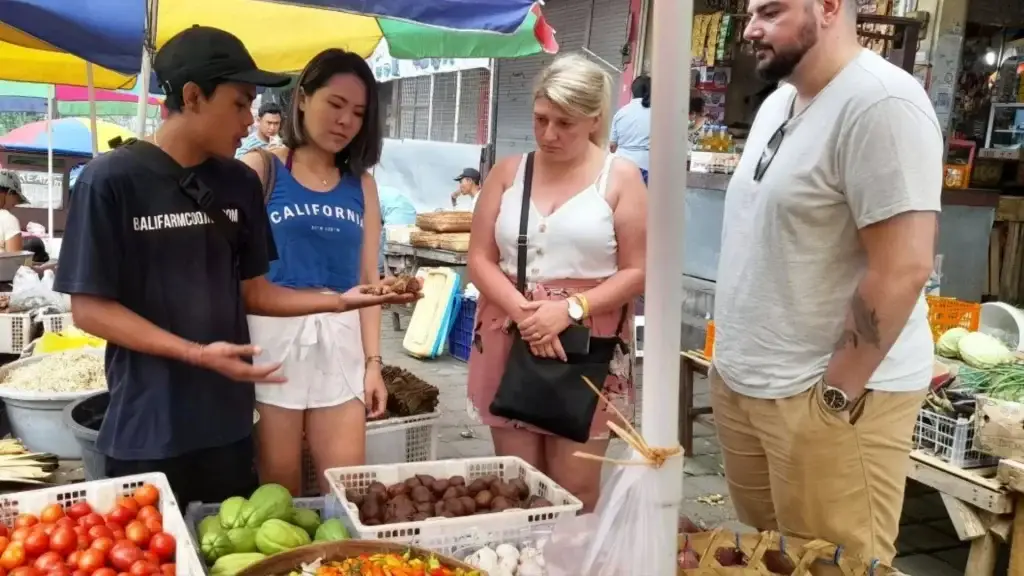
Practice “Aji Kuda” at the Ubud Market
Our Morning Class starts at the traditional market. We’ll help you use your new Balinese phrases to find the freshest galangal and turmeric.
Bonus: Balinese Words for Food Lovers & Cooks
If you are visiting a traditional kitchen (Paon) or joining a cooking class, these words will help you understand the soul of Balinese flavor.
| English Word/Phrase | Balinese Word/Phrase |
| Kitchen | Paon / pa-on |
| Complete Spice | Base Gede / bha-sa g-day |
| Mortar & Pestle | Ulekan / u-lek-an |
| Vegetables | Jukut / ju-qut |
| Cooked Rice | Nasi / na-she |
| Fried | Goreng / go-rank |
| Noodle | Mie / mi |
| Spicy (chili) | Lalah / la-la-h |
| So Yummy | Jaen San / john-son |
| Chicken | Siap / she-ap |
Putting It All Together: Introducing Yourself
Let’s learn how to introduce ourselves in Balinese! It’s always fun to learn new languages, especially when we can use them to make new friends.
| English Word/Phrase | Balinese Word/Phrase |
| It’s nice to meet you. | Demen metepuk jak ragane. |
| Name | Adan |
| Here | Dini |
| Staying at… | Ngoyong di… |
| This is my first time in Bali. | Niki pertama kaline Tiang ke Bali. |
| I often come to Bali. | Tiang suba sesai ke Bali. |
| Love | Demen or Cinta |
| Beautiful | Indah or Jegeg |
| Handsome | Bagus |
| Balinese people are friendly. | Orang Bali ramah. |
How to pronounce those words and phrases?
Conclusion & Your Next Adventure
Learning Balinese words and meanings can greatly enhance your experience in Bali. By understanding the language landscape and familiarizing yourself with key phrases, you will be able to navigate the island with ease and communicate effectively with locals. Remember, practice makes perfect. Don’t be afraid to make mistakes or ask for help along the way.
You’ve Learned the Words. Now, Experience the Culture.
The best way to truly understand Bali is through its food, its people, and its magical moments. Put your new phrases to the test and immerse yourself in an authentic experience.
[Book an unforgettable Ubud cooking class on our organic farm]
Frequently Asked Questions
Still have questions about the ancient village of Taro or our farm-to-table philosophy? Visit our About Us or Our Organic Farm pages to learn more about the sacred spirit of our location.

